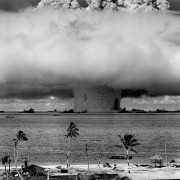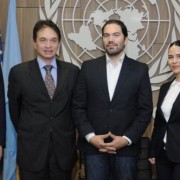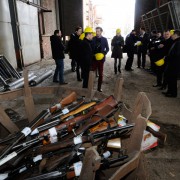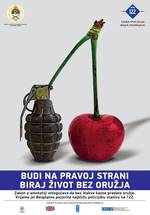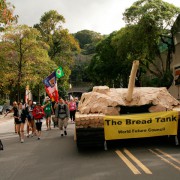Achieving a world without nuclear weapons: the contribution of domestic and regional policies
The establishment of Nuclear Weapon-Free Zones (NWFZ) in the past has made invaluable contributions to global nuclear disarmament. The further spread of such zones as well as adoption of domestic nuclear prohibition and divestment policies can pave the way for multilateral solutions. The World Future Council has developed proposals on how to further foster nuclear disarmament through national and regional policies.
Nuclear weapons are a global threat which requires a global solution. However, domestic and regional policies can make a vital contribution to advancing universal nuclear disarmament. While the treaties establishing the existing regional Nuclear Weapon-Free Zones are well known and generally regarded as critical contributions to global nuclear disarmament (together covering 114 states), the instances of national nuclear prohibition legislation and nuclear divestment policies have not received the same amount of attention or, indeed, credit. This is unfortunate as these policies have advanced nuclear disarmament, can inspire other countries to follow suit and contain lessons for the global disarmament endeavour.
Between 2 May and 13 May 2016 the Open-Ended Working Group (OEWG) met for a second round in Geneva to discuss proposals to take forward multilateral nuclear disarmament negotiations for the achievement and maintenance of a world without nuclear weapons. The OEWG was established on the basis of a UN General Assembly resolution. Among the participants were numerous countries (though notably absent were all the nuclear-armed states), advocacy groups, research institutes, academic institutes and think tanks, including the World Future Council.
From domestic to international law – Stories of successful legislation
Some countries, such as New Zealand, the Philippines, Austria and Mongolia have banned nuclear weapons through national legislation. These policies have contributed to strengthening the nuclear prohibition norm and addressed specific security challenges.
Some of the laws contain innovative elements such as individual responsibility and extraterritorial application in the case of the New Zealand law, which prohibits New Zealand’s citizens and residents to manufacture, to acquire, to possess or to control nuclear weapons as well as to aid and to abet any other person to do so anywhere in the world. These aspects of the policy could be useful to multilateral efforts to criminalise nuclear weapons employment such as through the Rome Statute for the International Criminal Court.
In the case of Mongolia, the country’s subsequent work to have its nuclear weapon-free status recognised and respected through acquiring assurances by the nuclear-armed states they won’t target Mongolia with nuclear weapons, means its policy is seen to have acquired the status of ‘Single State NWFZ’.
All policies contain elements and lessons that could be considered in the pursuit of similar policies elsewhere. The triggering effect of single countries building a regime of domestic regional nuclear disarmament law should not be underestimated.
For example, Belgium adopted national legislation banning landmines and cluster munitions as well as any investment in such weapons, before the international processes that would ultimately culminate in the 1997 Mine Ban Treaty and the 2008 Convention on Cluster Munitions had started. This demonstrates how domestic legislative initiatives can inspire, strengthen and shape the international processes that culminate in international disarmament treaties.
Banning investment in nuclear weapons
Divestment of landmines and cluster munitions producers has successfully been adopted in a number of countries. Divestment from corporations involved in the production of key components of nuclear weapons has not been pursued with the same vigour, though the Norwegian and New Zealand Government Pension Funds have implemented such schemes. More recently, the Swiss War Materials Act was revised to prohibit, inter alia, the financing of nuclear weapon producers. The effect of such divestment policies should not be underestimated. They contribute to stigmatising nuclear weapons and address the financial streams tied up in their production.
An interesting aspect of both nuclear prohibition and divestment policies is that they can lead to the democratisation of the nuclear disarmament debate, as they often originate from public movements and require legislators to become active on the issue. Furthermore, such policies can institutionalize nuclear disarmament expertise and commitment through the creation of organs committed to promoting policy objectives as well as become educational tools, both domestically and abroad. Perhaps most importantly, they offer a way for non-nuclear weapon states to take the initiative out of the hands of the nuclear-armed states, brandish their nuclear disarmament credentials, codify nuclear disarmament norms and in the process exert pressure on the possessor states.
Lifelong Canadian disarmament campaigner Douglas Roche has said that “the anti-nuclear weapons campaign is following the classic lines of other great social movements, such as the end of slavery, colonialism and apartheid: at first, the idea is dismissed by the powerful, then when the idea starts to take hold, it is vigorously objected to until, by persistence, the idea enters the norm of public thinking and laws start to be changed.” Countries should ensure they end up on the right side of history by adopting laws that strengthen and speed up the global effort to prohibit and eliminate nuclear weapons.
To learn more, explore the following links:
Nuclear-Weapon-Free Zones
Nuclear-Weapon-Free Zones or NWFZs are zones that have been established on the basis of a treaty or convention which are characterized by the total absence of nuclear weapons. Every state has the right and sovereignty to establish such a zone and to determine its frontier. An international system of verification and control guarantees compliance with the rules established. These zones must be recognized by the General Assembly of the United Nations.
